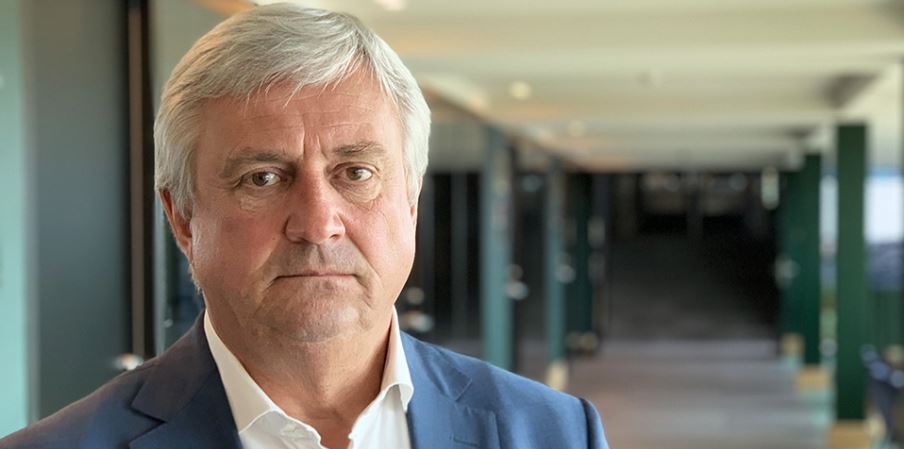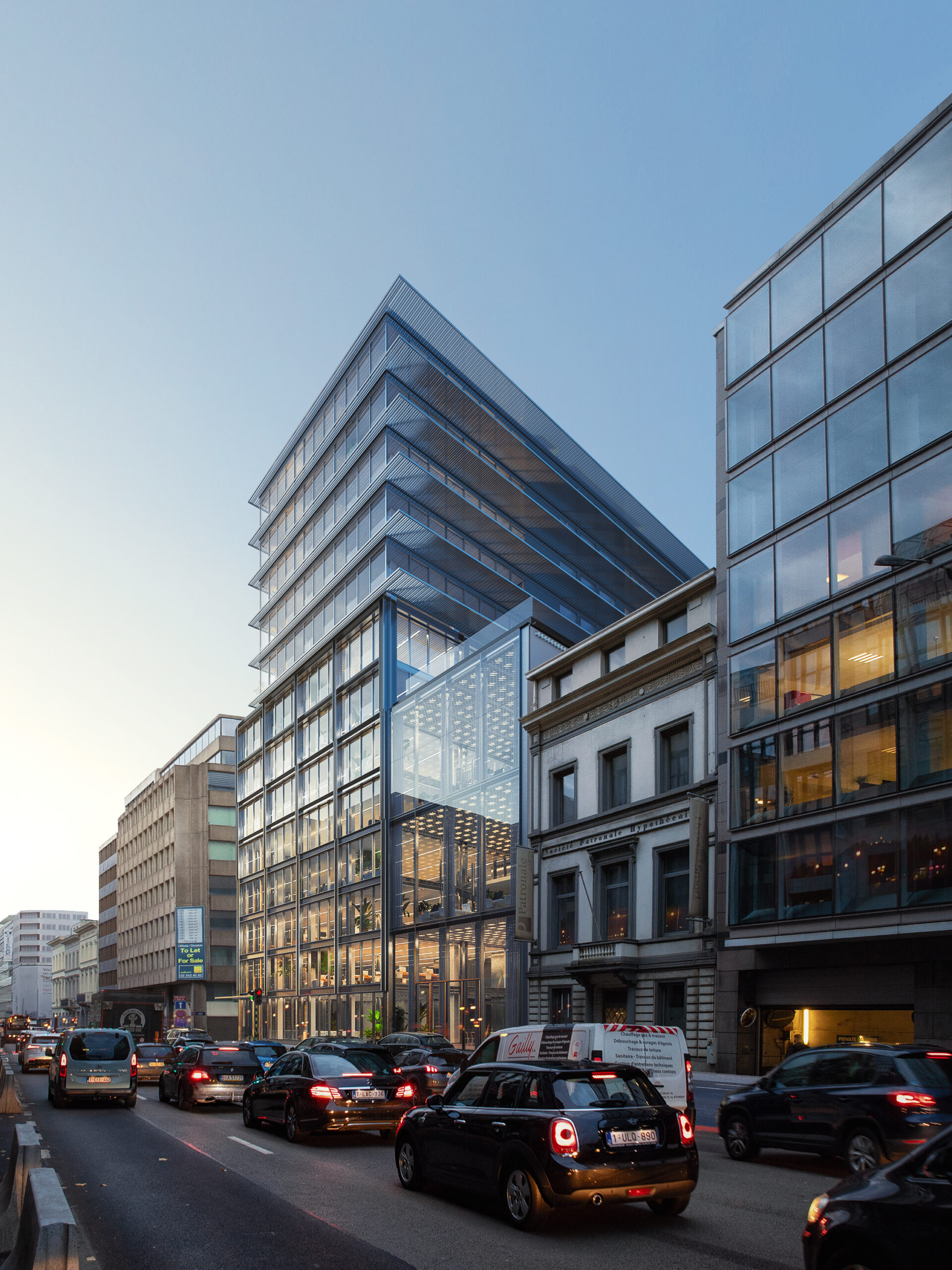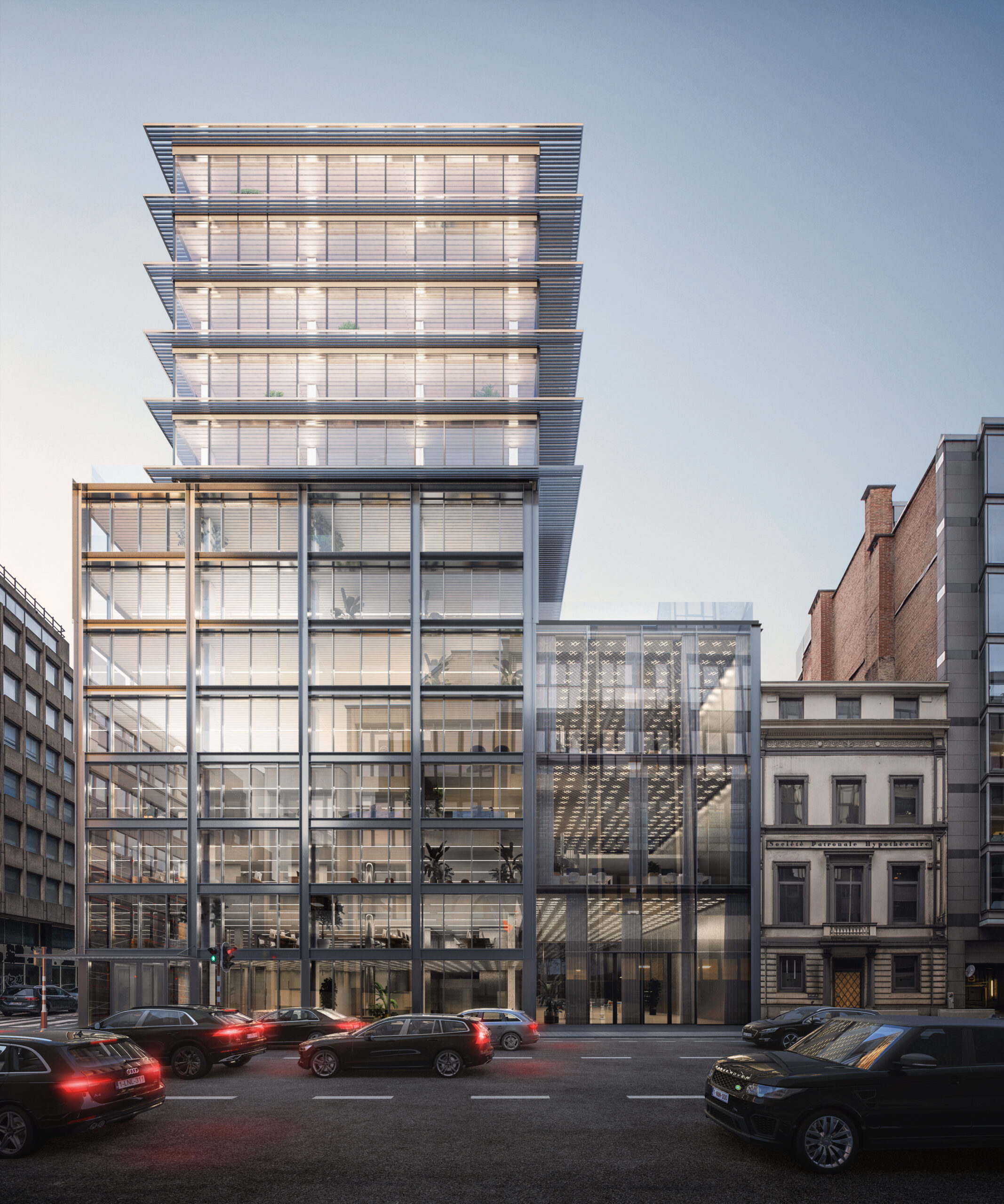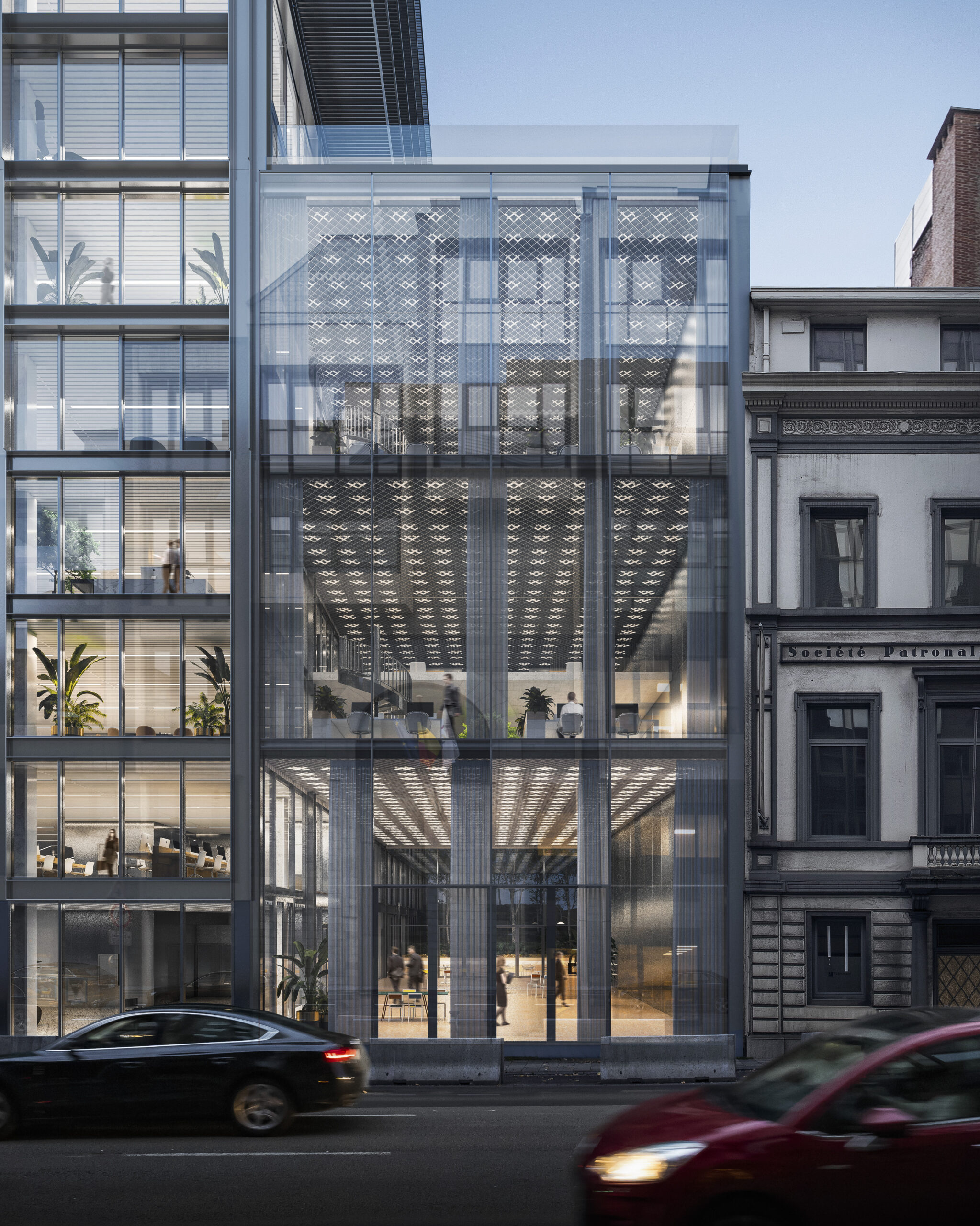Belgian-based facade technology company Fassada is bringing about a revolution in curtain walling, both in the way it is installed and the benefits it is capable of providing. The result is significant cost reduction along with advantages in areas such as building design and energy performance.
One of the company’s curtain walling concepts, the so-called hybrid system, can also integrate opening windows seamlessly.
How are they achieving this, and why have they chosen the Roto and Deventer brands as supplier partners? We spoke to Fassada founder and CEO Eric Claeys to find out more.
Eric Claeys has worked in facade development for over 35 years. In that time he has owned companies and delivered over 400 projects around the world. Now he heads up Fassada, a Belgium-based knowledge company that focuses on developing and marketing patented aluminium and steel curtain wall solutions for commercial and high-rise buildings.
Fassada came about as a result of Eric deciding the entire concept of curtain walling needed to be reinvented.

“We came to the conclusion that a new solution was needed”, he says. “I mean starting from a clean sheet, totally out-of-the box thinking”. A number of years of research and development ensued.
“The eureka moment for us came in 2015”.
Three years later, Fassada was fully up and running with patented designs on the market and making big strides with major projects in the Middle East.
Market-disrupting technology
“Our offer to the market is clear and simple”, says Eric. “We offer state-of-the-art methods of constructing facades. Not just innovative, but really groundbreaking. We are talking about technologies that are truly disruptive. Not just because of what they can achieve but due to the fact that they are so cost-effective compared to everything else out there”.
“On top of this, our technology brings genuine environmental benefits. Sustainability is such an overused word, it is often meaningless. But we can create a real reduction in energy use and CO2 emissions”.
Hybrid design
The Fassada product concept is based around technology that is effectively a hybrid of conventional stick and modular curtain wall systems. Unlike these older methods however, installation is performed entirely from the inside of the building without any need for scaffolding.
Another key difference is that the Fassada method allows for the mounting of external features, such as cladding, without requiring any anchor points to be set into the concrete structure of the building. This can be done with all kinds of materials, including aluminium, wood and natural stone.
These two differences alone result in significant gains in terms of installation time and safety. “There are also environmental benefits and many other practical advantages”, says Eric.
“The fact there are no thermal bridges or perforations of the outer shell of the curtain wall means a building can achieve levels of energy performance that are significantly better than with conventional techniques, all while reducing the possibilities of leaks and other problems”.

Making the complex simple
“All this is the result of the Fassada philosophy”, Eric states. “Our product development is always aimed at doing things better, simpler, more elegantly and more cost efficiently. There are lots of engineers out there who can make a simple task more complex; our aim is to make a complex task more simple”.
He goes on to explain how Fassada always focuses on the priorities of three “stakeholders”, these being the building developer, the architect and the facade contractor.
High performance and low maintenance
“The developer wants the building constructed within a timeframe, and they want that building to be of high performance and at the same time low maintenance. And of course they want it to be value for money” he says. “Meanwhile, the architect desires maximum design freedom and they want to be able to create this vision without technical worries. The other important factor for them is that they must meet all the sustainability requirements.
“Last but not least is the curtain wall contractor. They want a high performance system that will not require them to provide after sales service. It is ideal if they can reduce technical risks in construction. Of course they also desire to reduce costs so they can supply at a healthy profit margin”.

Monolithic mullion
Fassada aimed to meet all of these requirements by creating a hybrid system based around a standard technology platform, a so-called “monolithic mullion”. This has vastly reduced the number of accessories required for fitting and makes the work of installing curtain walls so much easier that unskilled workers can do it with a minimal amount of training.
Keeping out the sun
Within the curtain wall sector it is becoming increasingly important to help buildings achieve maximum energy efficiency in both summer and winter. As an example, Eric cites new regulations in the GCC region, where the maximum amount of glass on a curtain wall is limited to 40% of the total surface area. “That is just one example”, he says”. “All over the world, international building regulations, norms and standards are making “sun-keeping-out-structures” mandatory. It is just one of the huge challenges of climate change and the need to create real energy savings”.
“If you don’t have structures to keep the sun out, you won’t meet regulations anymore”, he continues. “Even the best heat-resistant glass is not enough. You need to add something to the outside and you need to fix it”.
“With conventional curtain walls it is a big issue. At Fassada we have the monopoly on being able to fit structures on the outside and install them from inside –– and it can be done at much lower cost. All materials are possible, such as wood, bamboo, stone strips, slats, GRC. There is really no restriction”.
45 areas of advantage
Eric and his team have identified no fewer than 45 areas in which they claim advantages over conventional curtain walling. These include acoustics, air tightness and drainage. Other advantages are cost reductions in areas such as geometric surveys and construction labour, as well as safety improvements.
An example of an aesthetic advantage is the elimination of distortion in the reflections seen on the side of a building. This is a common issue with curtain walls, caused by individual glazing panels warping due to tension when screws are tightened. “With our systems there are no screws”, Eric states. “Glazing beads are used to install the glass, so this problem of distortion can never occur”.
Aesthetic flexibility
In terms of building aesthetics, the biggest benefit by far is the way in which the external mullion can be provided in different shapes depending on the requirements of architects. The standard range has six different mullion designs, including two that have a sun screen integrated in the curtain wall. Bespoke designs are also possible. “Even though there is a standard set of profiles, we can easily modify the design for specific projects”, Eric explains.
Opening windows
On a traditional curtain wall, it tends to be obvious when an opening window has been installed because it stands out visually. The framing around the opening vent looks considerably thicker than the profiles that separate the rest of the glazing.
“Our Fassada H60 and H75 systems allow opening windows to be fully concealed within the standard mullions and transoms” says Eric. “An opening window looks the same as a panel of fixed glazing, and this is the case whether viewed from outside or inside the building”.
Roto – the hardware of choice
Any operable part can be installed within the Fassada curtain wall. This has allowed the company to specify a number of different window styles for their clients to choose from, all of which use Roto hardware:
- Tilt-only units using Roto AL Designo, which can be either manual electromechanical operation.
- Tilt&Turn windows, also using Roto AL Designo.
- Parallel opening windows (also called pantograph windows) using Roto PS Aintree stainless steel stays.
“All of these types of window have benefits compared to the open-out vents that are usually fitted in curtain wall”, says Eric. “They provide better ventilation options and are safer too’.
Full Roto Tilt&Turn units can be made safe by fitting a special opening restrictor, which limits the degree by which the window can be opened in turn mode. This restrictor can be unlocked by keyholders for cleaning and maintenance purposes.
Using the best
Eric says he has known of Roto for many years during his involvement with the construction industry. When asked why Fassada has chosen to partner with Roto as the preferred hardware solution, he is characteristically straight-talking: “We just want the best. You can’t make a top quality, market-leading product and then put rubbish in it. If you use poor quality to save money initially, it just ends up costing more in the longer term”.
“With Roto we know we have the best chance of avoiding the cost of after sales servicing because we are using the best. The products give all the functionality we need, and we know they are reliable for a long service life”.
DEVENTER weatherseals
Alongside the exclusive use of Roto hardware, Fassada also specifies bespoke DEVENTER weatherseals on all of its systems. These are designed by the weatherseal specialists’ engineers to meet Fassada’s exact requirements.

Eric views the fact DEVENTER is part of the Roto group as a distinct advantage. “Fassada policy is to make sure we are only associated with the very best products. For us, DEVENTER is the perfect choice for gaskets because the brand meets all of our required criteria: product quality, the vision of the company, reputation and service. The fact that the gaskets are integrated with Roto hardware is a very logical approach. It all makes perfect sense”.
The people factor
The partnership between Fassada and the Roto group clearly works on an interpersonal level. “You need a personal touch to build relationships”, Eric opines. “Business is done among people. For us, the people factor is very important”.
He sees the partnership as long term and aligned with Fassada’s future plans. “Roto is a huge group. In comparison we are a shrimp, but a shrimp grows. We can deliver our solution globally and that is what we aim to do and become the number one supplier of curtain wall facades. Roto and DEVENTER can deliver worldwide and provide their service on every continent, so we are always assured of availability”.
E-commerce for global ordering
A key element in this worldwide approach is Fassada’s new ERP platform, which allows customers and facade builders to place orders online. The system also facilities technical and financial audits. Supplier partners including profile extruders deliver all the items directly to the client. “E-commerce and digital ordering is the way to go”, says Eric. “It helps that our product is very simple with only a few dozen different articles in our range of profiles and parts, whereas our competitors have numbers in the thousands”.
Case study: ING HQ, Brussels
The new headquarters of ING bank in Brussels is designed by leading architects David Van Seeveren and Jaspers-Eyers. Fassada came out on top in the tendering process as the only facade supplier achieving a 10/10 score, meeting all technical requirements and the vision of the architectural design.
Are you looking for a premium hardware partner to help you meet the most exacting requirements?
Please get in touch and our experts will be happy to arrange a consultation.
By completing and submitting the form below, you agree to our privacy policy.
